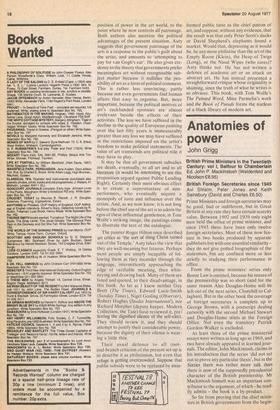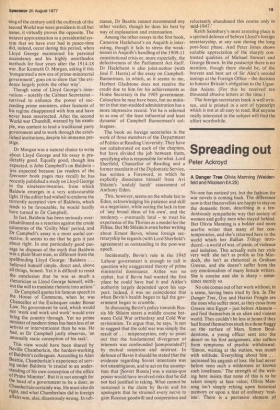Anatomies of power
John Grigg
British Prime Ministers in the Twentieth Century: vol I, Balfour to Chamberlain Ed. John P. Mackinstosh (Weidenfeld and Nicolson £8.95) British Foreign Secretaries since 1945 Avi Shlaim, Peter Jones and Keith Sainsbury (David and Charles £6.50) Prime Ministers and foreign secretaries may be good, bad or indifferent, but in Great Britain at any rate they have certain scarcity value. Between 1902 and 1939 only eight men held the office of prime minister, and since 1945 there have been only twelve foreign secretaries. Most of these now feature in two books produced by separate publishers but with one essential similarity — they do not give potted biographies of the statesmen, but are confined more or less strictly to studying their performance in office.
From the prime ministers' series only Bonar Law is omitted, because his tenure of the premiership was so short (and for the same reason Alec Douglas-Home will be left out of the next series, Churchill to Callaghan). But in the other book the coverage of foreign' secretaries is complete up to George Brown, with a postscript dealing cursorily with the second Michael Stewart and Douglas-Home stints at the Foreign Office. Not even the transitory Patrick Gordon-Walker is excluded.
At least three of the prime ministerial essays were written as long ago as 1969, and two have already appeared in learned journals. The editor, John Mackintosh, claims in his introduction that the series 'did not set out to prove any particular thesis', but in the Sixties there was rather more talk than there is now of the supposedly presidential character of the British premiership. Mr Mackintosh himself was an important contributor to the argument, of which— he readily admits — the book is a by-product.
So far from proving that the chief ministers in British governments from the begin fling of the century until the outbreak of the second World war were presidents in all but name, it virtually proves the opposite. The nearest approximation to a presidential system that we have ever had in peace-time did, indeed, occur during this period, when Lloyd George maintained his personal ascendancy and his highly unorthodox methods for four years after the 1914-18 war. But Kenneth O. Morgan, asking if this 'inaugurated a new era of prime-ministerial government', goes on to show that 'the evidence largely points the other way'.
Though some of Lloyd George's innovations — notably the Cabinet Secretariat — survived to enhance the power of succeeding prime ministers, other features of his regime disappeared with him and have never been resurrected. After the second World war Churchill, warned by his example, was content to lead a traditional party government and to work through the established institutions, despite his immense prestige.
Dr Morgan was a natural choice to write about Lloyd George and his essay is predictably good. Equally good, though less expected, is John Campbell's on Baldwin — less expected because (as readers of the Spectator book pages may recall) he has recently published a study on Lloyd George in the nineteen-twenties, from which Baldwin emerges in a very unfavourable light. If the editor had wished to endorse the currently accepted view of Baldwin, which tends to be favourable, he would hardly have turned to Dr Campbell.
In fact, Baldwin has been seriously overrehabilitated as a reaction against the crude calumnies of the 'Guilty Men' period, and Dr Campbell's essay is a most useful corrective. It seems to me that he gets it just about right. In one particularly good passage he disposes of the myth that Baldwin was a plain blunt man, so different from the Spellbinding Lloyd George: 'Baldwin . . believed himself simple, direct and, above all things, honest. Yet it is difficult to resist the conclusion that he was as much a rhetorician as Lloyd George himself, without the will to translate rhetoric into action.'
Dr Campbell quotes his famous speech in the House of Commons, when he was Chancellor of the Exchequer under Bonar Law. No government he said, which would not 'work and work and work' would ever bring the country • through. Yet no prime Minister of modern times has been less of an activist or interventionist than he was. He had, as Dr Campbell justly observes, 'an unusually static conception of his task'.
This view would have been shared by Neville Chamberlain, the hardest-working of Baldwin's colleagues. According to Alan Beattie, Chamberlain's experience of serving under Baldwin 'is crucial to an understanding of his own conception of the office of Prime Minister'. But it is not enough for the head of a government to be a doer, as Chamberlain certainly was. He must also do tight, and what Chamberlain did in foreign affairs was, alas, disastrously wrong. In sub
stance, Dr Beattie cannot recommend any other verdict, though he does his best by way of explanation and extenuation.
Among the other essays in the first book, Cameron Hazlehurst's on Asquith is interesting, though it fails to stress the weaknesses in Asquith's handling of the 1909-11 constitutional crisis or, more especially, the
defectiveness of the Parliament Act itself, Dr Hazlehurst is also joint-author (with Jose F. Harris) of the essay on CampbellBannerman, in which, as it seems to me, Herbert Gladstone does not receive the credit due to him for his achievements as Home Secretary in the 1905 government. Colourless he may have been, but no minister in that star-studded administration has a more impressive record. Yet he is referred to as one of 'the least influential and least dynamic' of Campbell Bannerman's colleagues.
The book on foreign secretaries is the work of three members of the Department of Politics at Reading University. They have not collaborated on each of the chapters, but have divided the job between them, specifying who is responsible for what. Lord Sherfield, Chancellor of Reading and a former mandarin of the Diplomatic Service, has written a Foreword, in which he explicitly dissociates himself from Avi Shlaim's 'unduly harsh' assessment of Anthony Eden.
This, however, seems on the whole fair to Eden, acknowledging his patience and skill as a negotiator, while noting the lack in him of 'any broad ideas of his own', and the tendency — eventually fatal — to treat his experience of the Thirties as a model for the Fifties. But Mr Shlaim is even better writing about Ernest Bevin, whose foreign secretaryship he regards (with Lord Sherfield's agreement) as outstanding in the post-war epoch.
Incidentally, Bevin's role in the 1945 Labour government is enough to call in question why exaggerated theory of prime ministerial dominance. Attlee was no cipher, but if Bevin had wanted the first place he could have had it and Attlee's authority largely depended upon his support. Indeed, it was no coincidence that when Bevin's health began to fail the government began to crumble.
In discussing Bevin's policy towards Russia Mr Shlaim steers a middle course between Cold War orthodoxy and Cold War revisionism, To argue thus, he says, 'is not to suggest that the cold war was simply the result of misperception, only to point out that the fundamental divergence of interests was confounded 'compounded?) by mutual suspicion and mistrust. In defence of Bevin it should be stated that the evidence regarding Soviet intentions was not unambiguous, and to act on the assumption that (Soviet Russia] was a status-quo paver would have involved risks that he did not feel justified in taking. What cannot be sustained is the claim by Bevin and his apologists that he strained every nerve to gain Russian goodwill and cooperation and reluctantly abandoned this course only in mid-1947.'
Keith Sainsbury's most arresting place is a spirited defence of Selwyn Lloyd's foreign secretaryship, at any rate during the long post-Suez phase. And Peter Jones shows suitable appreciation of the sharply contrasted qualities of Michael Stewart and George Brown, In the postscript there is no mention, though there should be, of the bravest and best act of Sir Alec's second innings at the Foreign Office — the decision to honour Britain's obligation to the Ugandan Asians. (For this he received ten thousand abusive letters at the time.) The foreign secretaries book is well written, and is printed in a sort of typescript which is not at all easy to read. But anyone really interested in the subject will find the effort worthwhile.
































 Previous page
Previous page